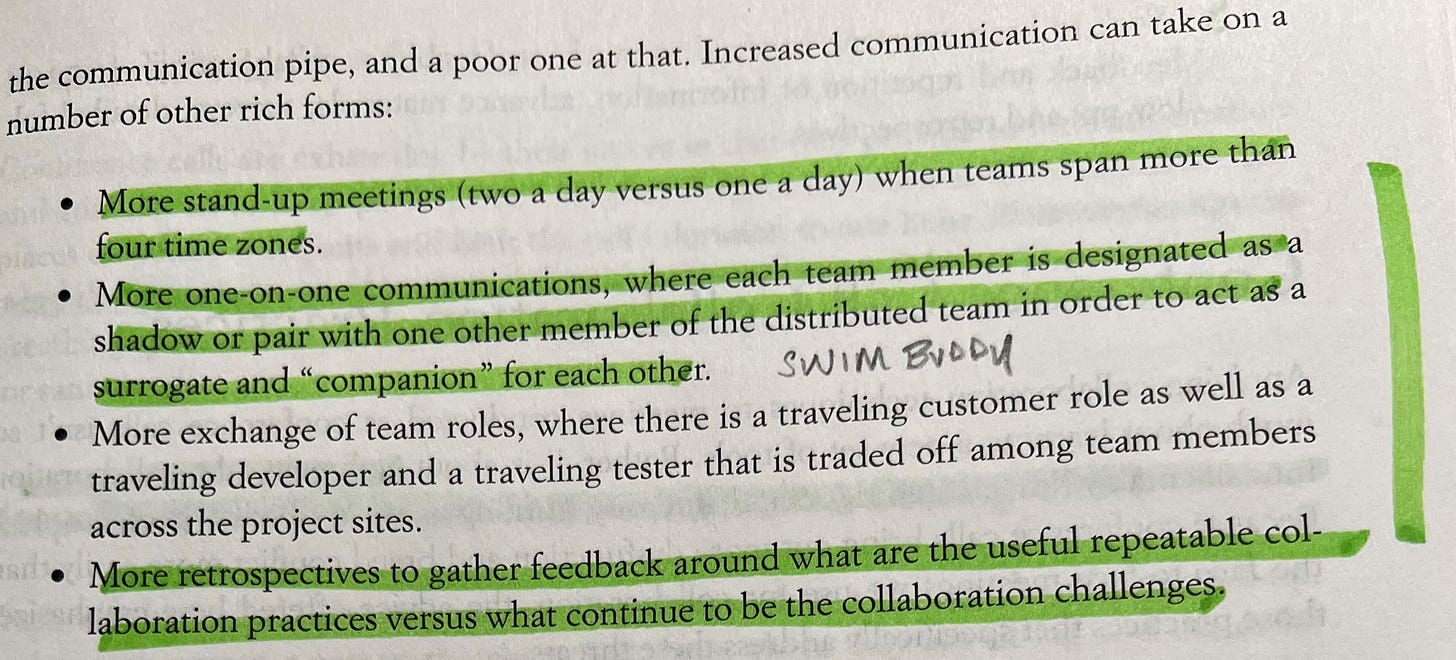Agile Notes (No. 64)
Best Practices for Distributed/Remote Teams
Hello, hello, hello! Welcome new subscribers!
We are wrapping up our adventures into the incredibly helpful Collaboration Explained by Jean Tabaka. I think this might be the last post on this book. There is still a lot of great information available but it isn’t really screen-grab friendly. We finish with Chapter 22: Collaboration Practices for Distributed Teams.
Tabaka prescribes a framework of best practices for working with remote teams:
Maintain a Metaphor
Apply Frequent Communications
Intensify Facilitation
I’m skipping Maintain a Metaphor. Is there where we get Teams calling themselves nicknames? Like - Team Unicorn?
The general prescription for Remote Teams is MORE COMMUNICATION which includes MORE FACILITATION. :) Tabaka writes:
Recognize that distributed teams have a far greater challenge to move out of Forming and to navigate Storming. As a result, conflict will be the norm rather than the exception. Collaboration approaches for non co-located teams must therefore concentrate on the Forming practices…
She recommends facilitators:
Stay MORE actively engaged as a facilitator.
Ask MORE frequent questions to spark discussion and consensus.
Actively seek out MORE opportunities to serve, don’t wait for someone to ask for your help.
Repeat MORE often to solidify understanding of topics being discussed and decisions being made.
Work MORE to keep engagement levels up.
You have to be a little EXTRA when your teams are remote. I like what she recommends in the screen grab. You have to be a little more aggressive or maybe the word should be “active.” You can’t be passive. You can’t sit back and wait.
She suggests having MORE Standups. Two a day. I am a firm believer in a morning stand up. Maybe an end of day one can happen in your group communications tool (Slack/Teams/etc). (And I understand that “end of day” is a relative concept when you have teams that follow the sun.)
You can see I wrote “swim buddy” after the second bullet. In American (at least in the days of black and white when I grew up) summer camps or Boy Scouts you were paired with a “swim buddy” when were in or around a pool. You and your swim buddy were supposed to look out for each other. It’s good to have a “buddy system.” In our context, I love the idea of a newer team member being paired or partnered with a more tenured person. I believe in mentoring relationships. ACTIVE mentoring.
I also like the idea of MORE retrospectives. MORE after action reviews. MORE post-mortems. MORE RCAs (root cause analyses). They don’t have to be long, drawn out activities. Think of OODA loops. If you practice a retro immediately after something broke rather than waiting until the Sprint ends, it will be fresh and the quality of the learning will increase exponentially. The more you retro, the faster you will get.
What about about you? What do you do with your remote teams to help them get tighter? What has worked for you? What hasn’t worked?
Thanks for reading! Please like, share, subscribe and comment!


